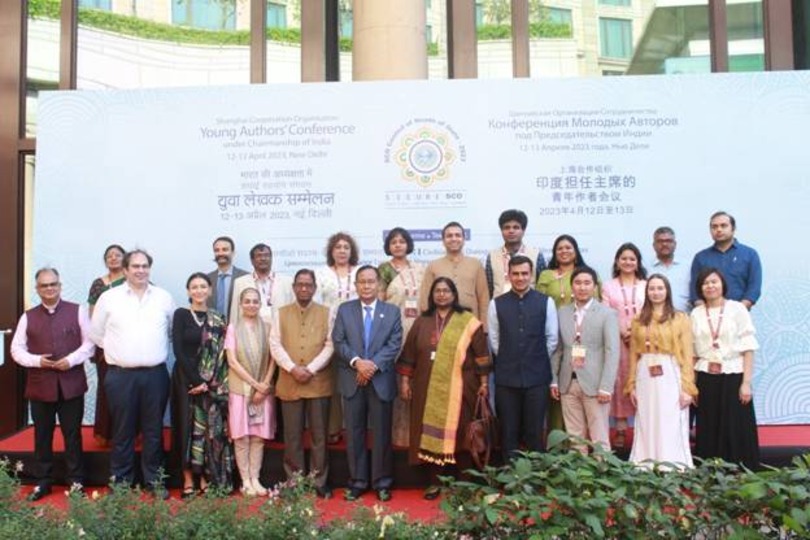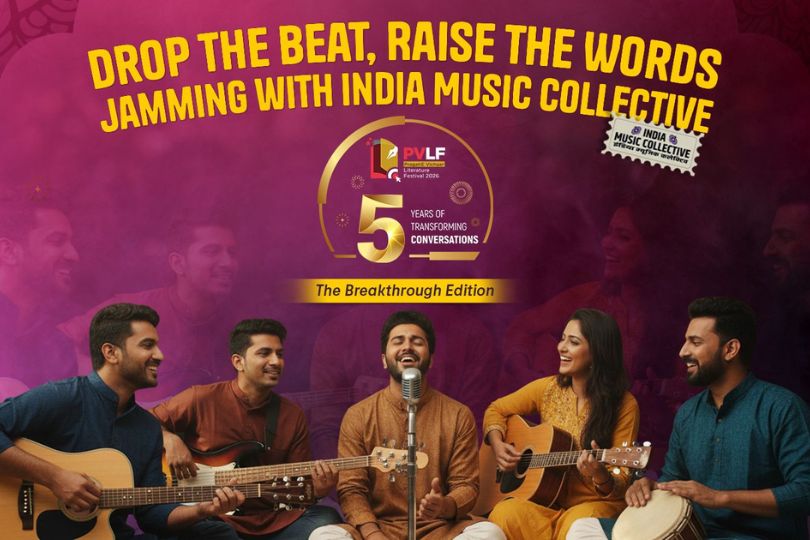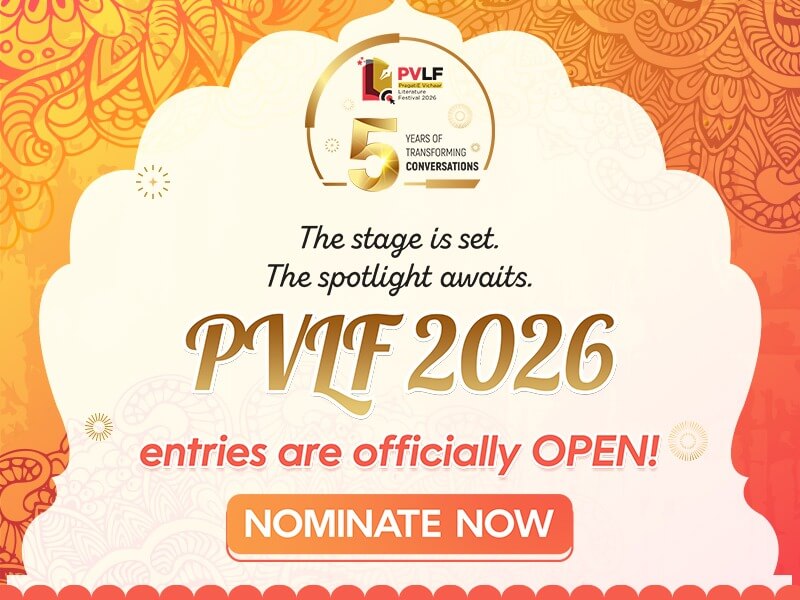SCO Young Authors' Conference Concludes with Focus on Civilizational Dialogue Among Member States
The speakers discussed the relationship between the film and book industries to provide a fresh perspective on the many aspects of the economy, the history of commerce between India and Central Asian nationson Apr 14, 2023

The two-day Shanghai Corporation Organisation (SCO) Young Authors' Conference on "Civilizational Dialogue Among SCO Member States" concluded on April 13, 2023, with attendees from SCO Member Nations.
Shri Rajkumar Ranjan Singh, Minister of State for External Affairs and Education, presided as Chief Guest at today's SCO Young Authors' Conference Valedictory Ceremony. The Ministry of Education hosted the Conference on April 12-13, 2023, at the Leela Palace in New Delhi, with the National Book Trust of India serving as the implementing agency.
According to Shri Rajkumar Ranjan Singh, India has actively participated in the organization's cooperative operations and is a highly regarded member. The SCO Young Authors' Conference's emphasis on shared civilizational connections authentically represents the area's people. The Conference was a testament to our dedication to contributing to the organization's success.
In his lecture, Prof. Govind Prasad Sharma, Chairman of NBT, stated that dialogue is the primary channel for keeping any human community and civilization alive. The Conference highlighted young people's connection with their community and neighboring nations and the desire to enhance intercultural collaboration.
While offering the vote of gratitude, Shri Yuvraj Malik, Director, NBT, stated that the Conference was an enriching experience due to the interchange of perspectives and ideas. The discussion shed light on the interconnectedness of humans and society and language as a social instrument that allows connection between distinct cultures while fostering knowledge growth.
The topic of the SCO Youth Conference was "Civilizational Dialogue Among SCO Member States," with six sessions focusing on History & Philosophy, Economy, Religion, Culture, Literature, and Science & Medicine, in that order.
Dr. Yuthika Mishra chaired the first session on History and Philosophy, which focused on 'Shared Civilizational Links and Their Impact on Modern Ethical Behaviour,' with panelists Ms. Ekatherina S. Manoylo from the Russian Federation and Dr. Ayesha Gautam from India. Prof. Ajoy Karnati moderated the discussion.
The speakers delved into the SCO nations' commonalities, the need for dialogue and cooperation by looking back at historical exchanges that facilitate understanding, the relationship between morality and traditions, and the conditions that gave rise to thought systems that traveled between countries. Dr. Aarshi Dua, Dr. Ruchi Verma, and Mr. Fahad Nahvi contributed extensive remarks and questions to the discussion.
The second session focused on the sub-theme Economy, specifically "Trade and Commerce Linkages." Dr. Sunil Ashra presided over the session, which featured speakers Ms. Anastacia V. Volodina of the Russian Federation and Dr. Pravesh Kumar Gupta of India. Mr. Kumar Vikram moderated the discussion.
The speakers discussed the relationship between the film and book industries to provide a fresh perspective on the many aspects of the economy, the history of commerce between India and Central Asian nations, and how trade routes changed over time. Dr. Ritika Joshi and Dr. Tasha Agarwal, the discussants, brought valuable perspectives to the conversation.
The third session focused on religion, concentrating on the 'Movement of Religious Ideas and Thoughts in the SCO Regions.' Mr. Chamu Krishna Shastri presided over the session, which Ms. Deepa Singh moderated. Ms. Nurlan Kyzy Begaiym of Kyrgyzstan, Dr. Pranshu Samdarshi of India, and Ms. Ainur Akhmetova of Kazakhstan were on the session's panel.
The panelists discussed the prevalence of multi-religious, syncretic civilizations in their nations, the importance of spirituality, the ancient interconnections between SCO members, and the need to exploit this cooperative spirit to broaden the notion of conversation.
The panelists followed the conversation, Dr. Aarshi Dua and Dr. Ritika Joshi, shared their thoughts on the importance of narrative and social media in spreading religious beliefs.
The fourth session focused on culture, emphasizing the "Civilizational Roots of Contemporary Cultures." Dr. J.K. Bajaj chaired the session, and the moderator was Ms. Neera Jain. The speakers were Dr. Rashmini Koparkar of India, Mr. Erkanat Khuatbekuly of Kazakhstan, and Ms. Anastacia V. Volodina of Russia.
The panel discussed how, in this age of fast progress, culture aids in preserving our identity and legacy. Since time immemorial, India and Central Asian countries have seen the interchange of ideas, trade, and language, allowing the creation of a shared cultural legacy.
Ms. Ivy Handique and Mr. Mayank Singh Singh advanced the discussion with their thorough input.
The fifth session of the Conference was conducted on the sub-theme of Literature, concentrating on 'Translation and Interpretation of Literary Texts.' Prof. Badri Narayan presided over the session, which was mediated by Mr. Kumar Vikram. Ms. Ekatherina S. Manoylo of the Russian Federation, Ms. Tanvi Negi of India, Ms. Ainur Akhmetova of Kazakhstan, and Dr. Sonu Saini of India served on the session's panel. The speakers discussed the rich corpus of Literature found in all SCO states, translation as a medium between cultures and languages, and the complications that surround it.
Ms. Anagha Gopal and Mr. Sumant Salunke, the session's discussants, led the conversation with remarks and intelligent questions.
The concluding session of the two-day SCO Young Authors' Conference was on the topic of Science & Medicine, with specific attention on 'Perspectives on Science and Medicinal Knowledge Systems of SCO Member States'. The session's distinguished panellists included Dr. Aditya Kolachana of India and Ms Nurlan Kyzy Begaiym of Kazakhstan. The Chairperson was Mr Maxim A. Zamshev of the Russian Federation, and the moderator was Ms. Neerja Anand. The panel discussed the role of medicine in the twenty-first century and the need to strike a balance between traditional and modern medical practises.
India has been successful in establishing ancient medical practices such as Ayurveda as scientifically valid. It was also mentioned that these ancient medical knowledge systems may be found in Kyrgyz and Indian epics. Ms Damini Roy, the session's discussant, kicked off a round of questions and answers with her observations.
The Conference brought new insights from the attending delegates, academics, and presenters on the shared and different qualities of our cultures and heritage while emphasising the significance of Literature in facilitating cultural connections.



.jpg)






.jpg)

.jpg)

.jpg)
.jpg)
.jpg)
.jpg)

.jpg)










Sorry! No comment found for this post.